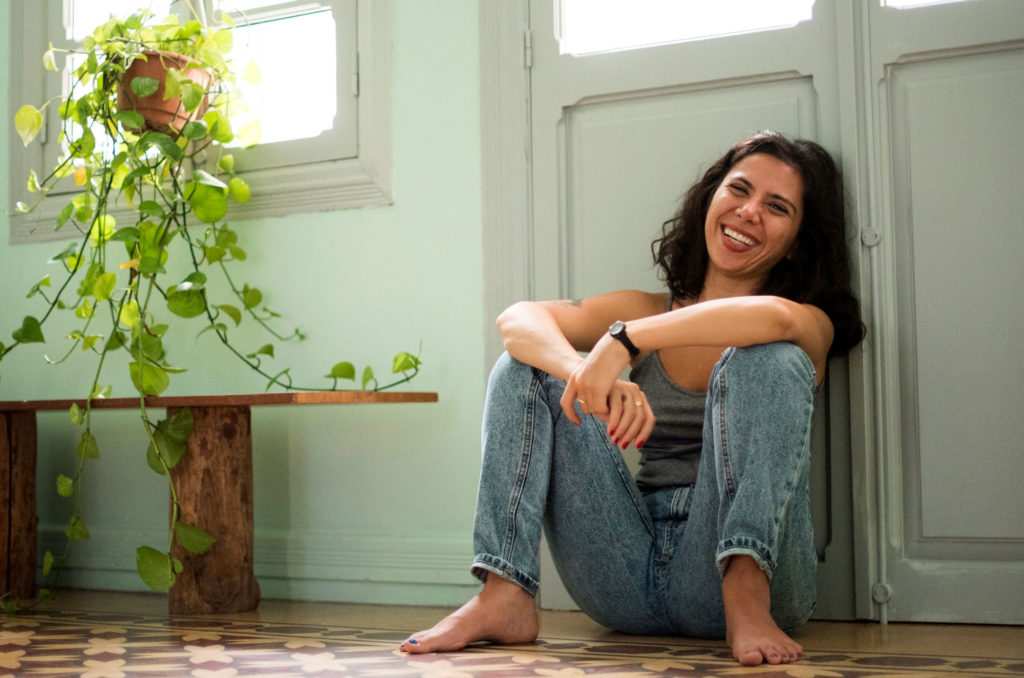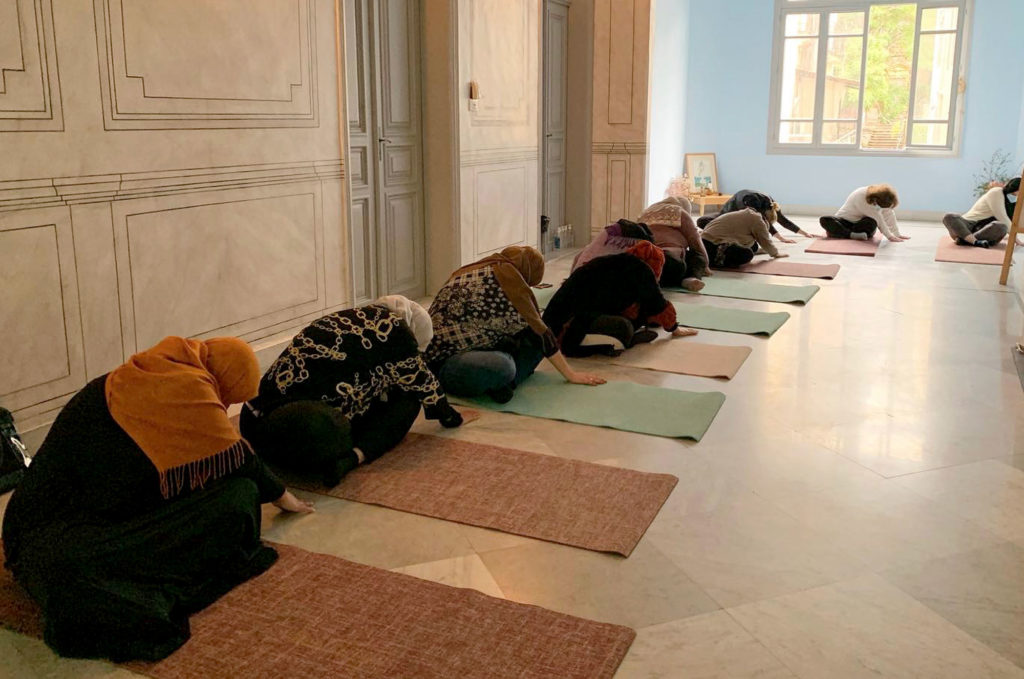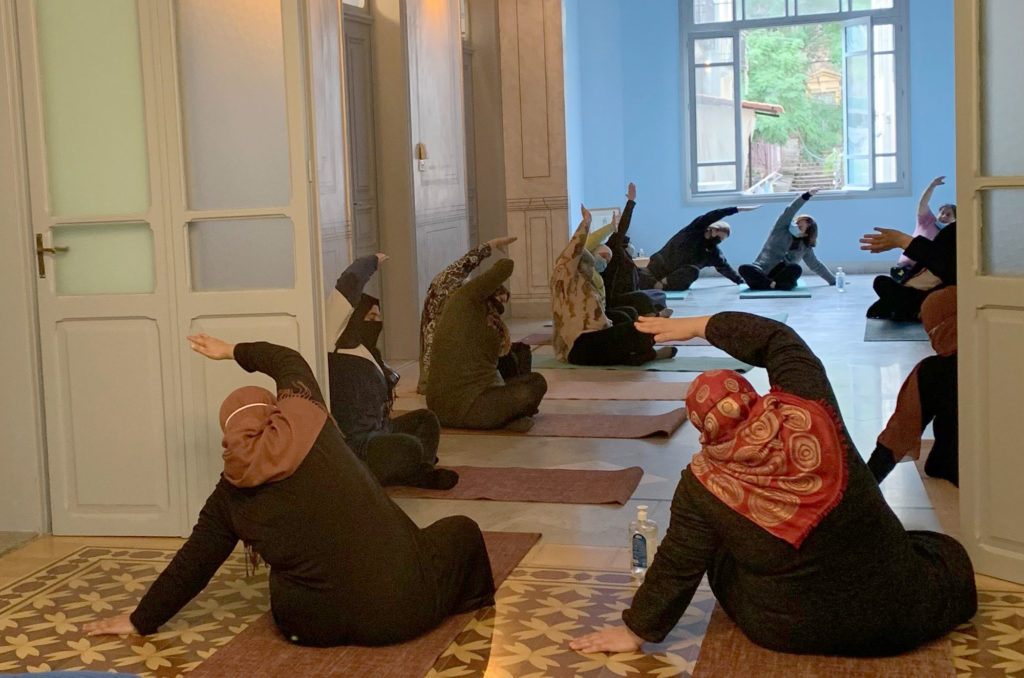An Interview with Sandy Boutros on International Women’s Day
Posted in: Life in the Middle East, Society & culture
This interview with Sandy Boutros, the founder and director of Koun, is the first in our new series highlighting Arab youth change-makers. Read the second piece in the series here.
Why Koun? Tell us about yourself and your organization.
Koun is an impact-led organization that strongly believes in the power of the mind, and one’s ability to transform their life through the enhancement of self-awareness and the release of physical, mental and emotional tensions. The reason I started yoga and specifically meditation at the age of 22, back in 2012, was my high level of anxiety, insomnia and inability to stop my mind from over-thinking. I watched my mind changing over the years and turning me from a passive pessimist person who doesn’t grasp and accept the suffering of the world into an active, grounded woman who believes in her infinite potential and who’s willing to do all she can to change the world by creating some ripples here and there.


Koun started as a one-woman-show in 2018 when I noticed that people who really need yoga in their life will never be able to access it and don’t even know about it. Those who come to yoga studios, have the privilege to do so and think that the practice belongs to a certain social class and individuals with a certain level of awareness. I wanted to break this stereotype and make it accessible to everyone!
I started going by myself to refugee camps and migrant community centers in Akkar, Tripoli and Beirut, spreading yoga in a very simple, scientific and systematic way and teaching the beneficiaries how to adopt it in their daily life to manage their constant stress and hardships. Being graduated from the world’s first yoga university, Bihar School of Yoga, in classical yoga and mind management made it much easier for me to connect with the communities and teach them the tools they need.
The strong effect of yoga on the individuals I worked with made me realize that I want the practice to reach as many people as possible and led me to the establishment of Koun, which was legally registered in January 2020.
Describe the role that women play during times of crisis.
Women have this incredible and magical ability to focus on several important matters during crises without sinking into the problem and getting blinded by it, whether it’s humanitarian, social, financial or political. Their emotional intelligence allows them to be the support system of the entire family, especially their children. I have heard tens of stories of single mothers rebuilding their whole life after escaping the war in Syria; of women getting creative with ways of making extra income after the financial crisis in Lebanon; of mothers learning how to use Zoom to support their children when schools were closed and women dedicating all their energy and time to be there for the more vulnerable ones to uplift them.


How does bettering women’s mental health impact the community?
Women are the essence of the family – they are the ones who raise children; they’re the ones who inspire and the ones with endless power and potential. Impacting the mental health of one woman, impacts the psychological well-being of her family which affects the whole community.
A mother with an enhanced mental health and an increased sense of awareness will be able to create a healthy environment at home, where girls feel strong and empowered and boys feel responsible and equal to their sisters. Women will be also able to put boundaries to their husbands and stand for their own rights, as once they get in touch with their power and self-value, they will stop accepting any type of violence, repression and humiliation. A relaxed mind is a strong mind and a strong mind is the first step towards freedom.
What shocked you while working with refugee women?
Working with refugee women made me hear stories that I only see on screens, but the real shock was their level of receptivity and openness. The impact of yogic practices on these women is at least ten times stronger than its impact on women who are consciously choosing to step into a yoga class.
Refugee women in Lebanon face a lot of hardships, traumatic events, discrimination, repression and racism – their strong need for a moment of stillness made them experience deep states of relaxation from their first yoga session, which got them hooked to the practice.


What are the stresses that you see women carrying in the society around you?
Apart from the daily stress that everyone is facing in Lebanon nowadays, women from marginalized communities are the ones getting the most affected by the situation. Seventy-five percent of the women we’re currently working with are getting physically abused by their husbands who were hit by the economic crises in Lebanon, and in some cases they’re being forced to send their children to the streets, risking their physical, mental and emotional well-being. Women who don’t get support from outside of their bubble feel stuck and helpless which makes them normalize the unfairness and ugliness of the patriarchal society.
Why are safe spaces important for women and society?
Vulnerable women have a lot to deal with which makes them forget about their sense of individuality and the importance of their own well-being. Safe spaces provide the women with a place to recharge, relax, experience some “me-time” and most importantly connect with other women whom they can inspire and get inspired from. Every woman deserves to empower and feel empowered, every woman deserves to reconnect with her inner-self and forget that she’s a wife and a mother for some time, every woman deserves to just “be.”
Do you think the humanitarian situation in Lebanon could have been worse had it not been for the efforts of women community leaders and humanitarians? How so?
With the absence of government and the laws that protect women in Lebanon, we can’t but be grateful for the existence of women leaders and humanitarians who realized how unacceptable the humanitarian situation in Lebanon is and chose to do something about it instead of just waiting for a miracle to happen. I have endless gratitude and appreciation for the women who believed in their own power and their ability to make this world a better place.
OUR BLOG
Related
Joint Statement 200+ NGOs call for immediate action to end the deadly Israeli distribution scheme (including the so-called Gaza Humanitarian Foundation) in Gaza, revert to the existing UN-led coordination mechanisms, and lift the Israeli government’s blockade on aid and commercial…

